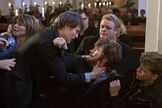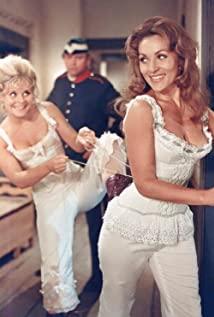From the screenwriter’s point of view, the opening part will be analyzed first. There are serious spoilers, and it is suitable to read the film more than twice.
In the first paragraph after the opening of the film, Lucas completed the appearance of the characters with three dramatic moves with obvious progressive relations.
1. To accompany everyone to hide and seek a game.
2. To wipe the buttocks of the boys.
3. To send the lost girl to the hostess to go home.
Lucas’ appearance design was quite meticulous, with three interactions, layer by layer, and all passive actions. Don't underestimate this passive design. After a series of passive designs are laid, Lucas' initiative will be subtle and strong.
The first interaction is the appearance of the male lead character, a group of children hide and seek, and Lucas appears as the target of the game. The children hid at the table behind the tree, waiting for Lucas to have a tacit hunting game, and Lucas was also very willing to cooperate. There is a seemingly random active behavior here. Lucas is observing the children behind the fence. I guess this choice was made during the editing, because this set of shots obviously took more than that. After the observation was over, he "had to" cooperate in this scene as a matter of course.
In the second interaction, a boy is in a hurry, and the principal habitually arranges for Lucas to take him to the toilet. Lucas certainly had no choice, but after the boy went to the toilet, we saw the children's arrogant attitude towards Lucas: the children had taken it for granted that Lucas needed to be responsible for all their needs. So when the boy asked Lucas to wipe his ass, although Lucas verbally protested the boy's natural attitude, he couldn't refuse it in action. This scene involves more intimate physical needs, which is a step deeper than the group game in the previous one. He again "had to" take responsibility for the child.
In the third interaction, after serving the people routinely in the kindergarten, she met the lone heroine. Here we also get a deeper understanding of the male protagonist’s psychology. The point of this scene was very clear. The little girl got lost and Lucas sent her back. All this happened outside the kindergarten, proving that Lucas' passive behavior came from his personality rather than from professional requirements. But in this plot point, an in-depth description of the psychology of both parties is inserted: the little girl lost her way because she was afraid of stepping on the grid line on the ground. When Lucas once again "had to" send Lolita home, the character's initiative finally began to show: he didn't care about being insulted at work, he didn't mind being treated as a doll by the children, but instead he gave to the sensitive psychological world of children. With a very serious attitude.
This dialogue completes the creation of two characters. For the little girl, it puts her psychological distance away from the frolicking group of children at the beginning. For Lucas, it also allows us to understand him beyond the other adults who want to dive in the ice lake for gambling money. (Because the diving action has a dew point, a few shots of the clean version have been cut.) So
far, Lucas’ appearance has completed a three-stroke passive character design, from playing with group children to taking care of the physiology of individual children. Demand, finally entered the psychological privacy of the heroine.
After sending the girl home, Lucas's identity as a single-parent dad was further developed, and this process was carried out in parallel with the hostess's living environment.
We saw that the heroine’s Daddy Beard communicated with Lucas for the first time, involving trust: Daddy Beard said that when you blink, I can see that you are lying. The character relationship tone here is relaxed and ridiculed. Daddy Beard is like every adult who feels good about himself. And Lucas's dog barked at Daddy Beard, and it also hinted at a hidden relationship crisis.
Lucas is a delicate and sensitive old man who never refuses the needs of children. He is divorced, he is not busy at work, has a lot of spare time, and is more caring. His attitude towards this job is not like that of the principal and grandma. He is only seen as a responsibility, but with love. How he is more sensitive than his reckless adult friends, has been shown in all aspects in just ten minutes at the beginning of the first act.
Let's look at our little girl again. How her parents spent a moment of joy and a moment of emotional venting, and neglected to understand such a sensitive girl, she also explained it in a very condensed background. They didn't want to love her, but they didn't understand her like Lucas. In the next few scenes, the little girl started a series of love gestures to Lucas and was frustrated one after another. After taking denial and revenge actions, the bloody storm of the second act kicked off.
The female colleague who was in chaos and abandoned is of course an important clue. She can't understand the anger of the male lead, and she doesn't deserve to enjoy the affection of the male lead. Because the degree of sorrow, joy, anger, and anger all ultimately point to a person’s sensitivity level indiscriminately, the female colleague is just a driftwood in the water that drifts with the crowd. This design is quite clear. Needless to say, if you don’t see the hypocrisy of this emotional line, you will find many details inexplicable.
Finally, I want to talk about the ending credits. Many commentators believe that it is the ceremony of giving a gun to the male protagonist's family to return to society. In fact, it is not a true adult ceremony. Everyone should remember the beginning that makes many people feel puzzling-that seemingly idle betting and diving scene-represents the real adult game: a group of forced and leisurely adults seems to be a closed world with passion. . Similar boring and exciting programs are constantly being staged, and it does not involve any serious emotions. And granting a boy a shotgun is nothing more than a formal etiquette like a diploma or driver’s license. It is even cruel to the boy because it is too serious, because the distance between him and the adult world is not close to the two brothers of the heroine who watch pornographic films.
After experiencing all this absurdity, Winterberg gave a sense of ritual and sacredness to the scene of giving the gun, but it was definitely not a return. Because for Lucas, the real protagonist of the film, it doesn’t matter whether he returns to society or not. When he and the girl meet again in the grids everywhere, and when he hugs her and says he wants to take a big step, the misunderstanding of society has long been obliterated. Forget about it. The scene of Lolita waving and laughing made my heart tremble. Faced with this smile, how could Lucas care about the black gun hidden behind him. (Analysis of who fired the black gun can also stop.) In the depths of Lucas's heart, he must rather accept her merciless whipping, maybe ten years later, but definitely not now. Not for anything else, just because he is the kind of uncle who can help Lori.
The pull film analysis has come to an end. Now I will defend the three points at the beginning of this article:
1 Regarding the opening of this film, I have already analyzed the film above, and the rhythm behind it is the same. The story is told cleanly and neatly.
2 Regarding the director's style, I have never heard of the director's track, but I guess that the editor of this film must be very stunned. As the saying goes, the director is the father, and the editing is the mother.
3 Regarding social significance, movies are of course socially meaningful. They are black only when they see the social meaning. In fact, it is no different from those who only see the social meaning and praise it. It depends on the social significance, why not just go to the Southern Zhou Dynasty?
The film is based on a classic structure with no nonsense and clean narrative rhythm. The three acts are clear and clear. The passive characters are perfectly shaped. It is enough to draw the film as a teacher. It eliminates the narrow prejudice that there must be another shore to overcome the boundlessness of the story creation. Ocean.
In fact, Dougma's 95 party has long ceased to be Dougma for a long time, and it has long since surpassed the cage of a declaration for himself. But dogmatists are still immersed in dogma, expecting "post-Dougma works" to be published with prejudices. After the film entered the field of commercial fans, it first brought a wave of fanfare, and then because of the high-end and glamorous expectations of the fandom group, it split into two black fandoms among the fans, often with "elephant" and "wave 》And other famous Japanese and American "social significance films" horizontal and vertical analogy.
There is also an interesting phenomenon, because the director of the film is too handsome and believes that they are a group of people who are a vase, just as Feng Tier is too depressed and believes that they are the same group of people who pretend to be forced.
—— —— —— —— The dividing line in May 2014—— —— —— ——
This article is a work of anger after being sprayed in a certain black film group last year. Although the anti-black film is a bit too old, it is also It doesn't mean that I feel that this film has made such awesome achievements. Dougma, in the final analysis, is just a gang of high-spirited people, who didn't want to be the headline party that shocked the industry when he was a bachelor.
This film is also a member of a motivated gang. It is a regular film that people took after middle age. The desirable thing is that they did not lie on young achievements and overcorrected. They used some Hollywood techniques to continue to tell some tear-jerking evils. This theme is also an old dish of Dogma, nothing more.
View more about The Hunt reviews











